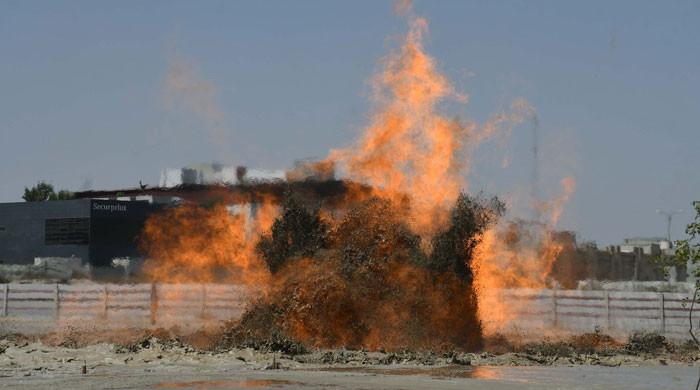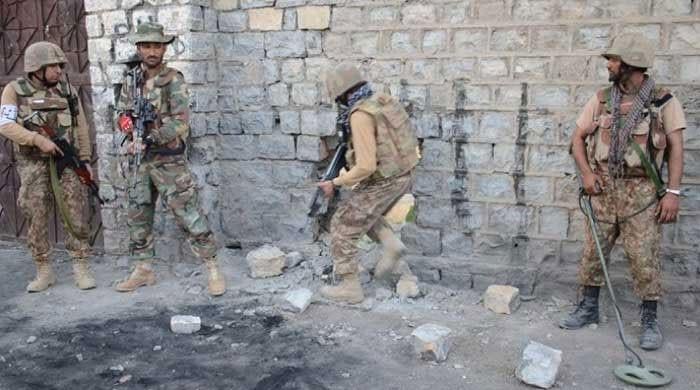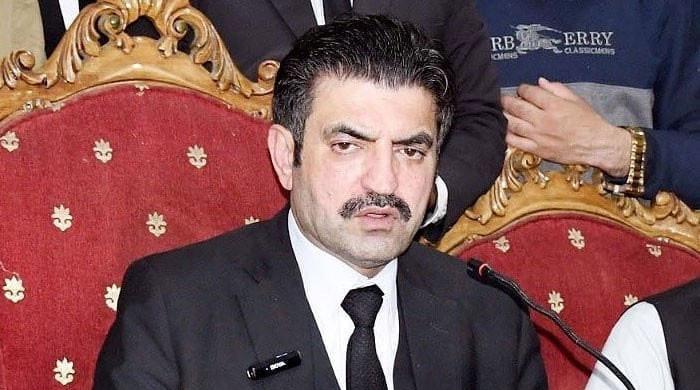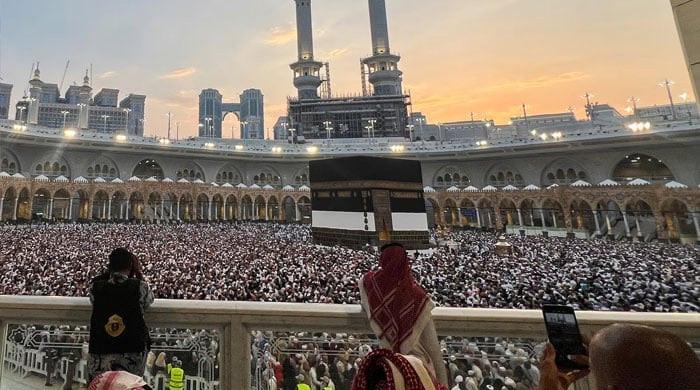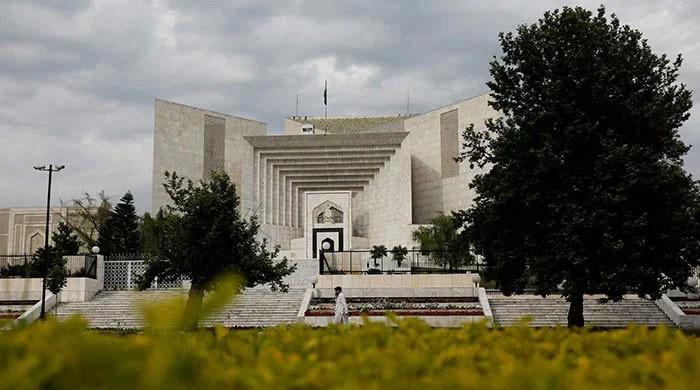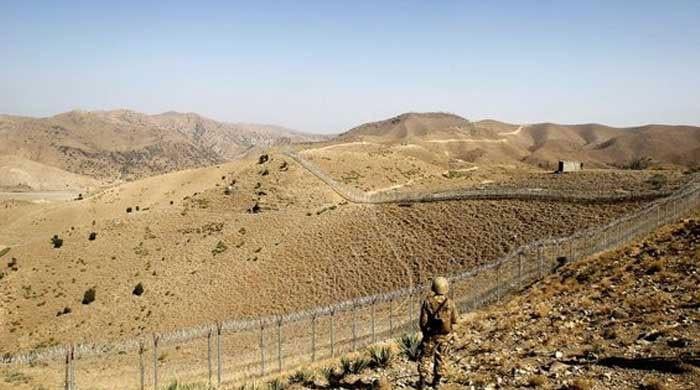Election date case: Justice Athar Minallah's dissenting note
"It is imperative that the matter regarding the violation and interpretation of the Constitution is heard by a full court," states note
February 27, 2023
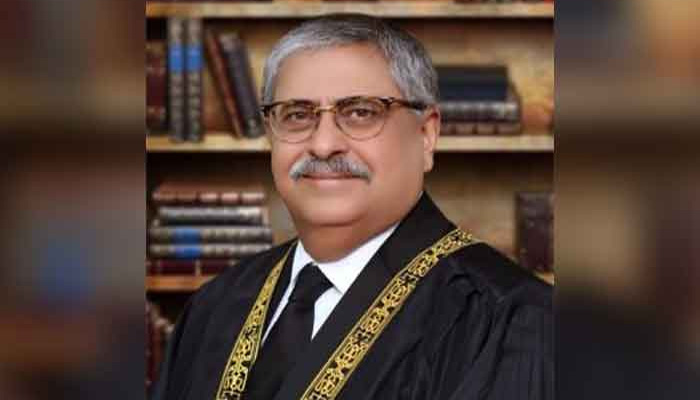
ISLAMABAD: Justice Athar Minallah of the Supreme Court (SC) was one of the four judges of the top court who recused himself from a nine-member bench hearing election date suo motu notice regarding a delay in the announcement of a date for elections in Punjab and Khyber Pakhtunkhwa (KP) on Monday.
The apex court was scheduled to resume hearing at 11am but the matter got delayed reportedly due to the dissolution of the bench in the light of the February 23 order of the SC which was issued today.
The bench was reconstituted after Justice Minallah, Justice Jamal Khan Mandokhail, Justice Mansoor Ali Shah and Justice Yahya Afridi sought a new bench in their dissenting notes.
However, a new five-member bench was constituted comprising Chief Justice Umar Ata Bandial, Justice Mansoor Ali Shah, Justice Munib Akhtar, Justice Jamal Khan Mandokhail and Justice Muhammad Ali Mazhar.
Justice Minallah concurred with Justice Yahya Afridi and said in his dissenting note that the order of Chief Justice Umar Ata Bandial "does not appear to be consistent with the proceedings and the order dictated" in the open court.
The SC judge noted that the questions raised before them cannot be considered in isolation because questions regarding the constitutional legality of the dissolution of the provincial assemblies of Punjab and KP cannot be ignored.
"Were they dissolved in violation of the scheme and principles of constitutional democracy before completion of the term prescribed under the Constitution of the Islamic Republic of Pakistan ('the Constitution')?"
Justice Minallah said the questions regarding the legality of the dissolution involve far more serious violations of fundamental rights, adding “the matter before us is definitely premature, because it is pending before a Constitutional Court of a province, as noted in the opinion of my learned brother Yahya Afridi, J."
Recalling the initial hearing of the case, he said that during the proceedings, he had proposed that the question of the legality of the dissolution of the respective provincial legislatures must also be examined before considering the matter placed before the court.
"The Hon'ble Chief Justice, who was heading the bench, had by assuming and invoking the suo motu jurisdiction conferred under Article 184(3), accepted to include the proposed questions for consideration. The learned brothers on the bench did not object and, therefore, while dictating the order in open Court, the inclusion of the proposed additional questions for consideration was duly acknowledged and announced. The Hon'ble Chief Justice was, therefore, pleased to assume/invoke the jurisdiction in consonance with the principles highlighted by this Court in suo motu case No.4 of 2021 (PLD 2022 SC 306)."
Justice Minallah then noted down the questions;
- Whether the power of a chief minister to make advice for the dissolution of the provincial assembly is [sic] absolute, and does not require any valid constitutional reason for its exercise?
- Is a chief minister to make such advice on his own independent opinion or can he act in making such advice under the direction of some other person?
- If such advice of a chief minister is found constitutionally invalid for one reason or another, whether the provincial assembly dissolved in consequence thereof can be restored?
According to Justice Minallah, the interpretation of the Constitution is the prerogative, as well as, the duty of the apex court, which, he added, is also an onerous duty to protect, preserve and defend the Constitution.
"It has been observed by this Court that the Constitution is an organic document designed and intended for all times to come," his note said, adding the interpretation of the Constitution by this court has a profound impact on the lives of the people of this country, besides having consequences for future generations.
The framers of the Constitution, Justice Minallah said, had conferred an extraordinary jurisdiction on this Court under Article 184(3) and the manner in which this power is to be exercised is in itself a matter of immense public importance.
"While invoking the jurisdiction great care has to be exercised. Article 176 of the Constitution describes the constitution of this Court. I am of the opinion that it is implicit in the language of Article 184(3) that the conferred extraordinary original jurisdiction must be entertained and heard by the Full Court. In order to ensure public confidence in the proceedings in [sic] hand and keeping [sic] in view the importance of the questions raised for our consideration, it is imperative that the matter regarding the violation and interpretation of the Constitution is heard by a Full Court. The interpretation of Article 184(3) of the Constitution in this context, there/core, also requires interpretation."




